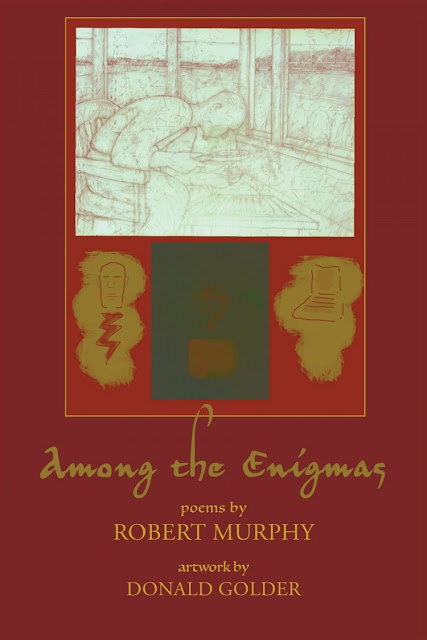Among the Enigmas
Poems
by Robert Murphy
Artwork
by Donald Golder
Dos
Madres Press
www.dosmadres.com
ISBN:
978-1-948017-52-7
61
Pages
Review
by Dennis Daly
Without
an inductive or deductive leg to stand on, Robert Murphy, in his new collection
of poetry, Among the Enigmas, nails the existential perplexities that niggle
our attempts to apprehend human consciousness and metaphysical selfhood. Quite
an accomplishment! He achieves his ends with humor, wordplay, and puckish subversions,
marbled throughout with his singular warmth and kindliness.
Additionally,
most of Murphy’s poems are paired up with intriguing artwork by Donald Golder.
Golder’s ink drawings and watercolor images both complement the knotty verse
puzzlements and tease away any trite conclusions.
Murphy
opens his collection with a nod to poet William Bronk in a lovely piece
entitled The Lay Of The Land—Hudson Falls New York, Just This Side Of
Elysium. He recalls sending his fellow poet a myth laden daffodil, properly
named poeticus narcissus. The flower was spoken of by Virgil and is
associated with Persephone (she had been gathering them before her abduction
into the Underworld) and Narcissus (the goddess Nemesis turned him into the
flower). Bronk, who lived Hudson Falls New York, died there in 1999. Here is
the heart of Murphy’s poem,
I
sent Bill the poet’s flower, poeticus narcissus, variety
old
pheasant eye. Those ones that are fragrant,
almost
impossibly so, an echo of the Mediterranean world
from
which they come, pure white, with six (as it is described
in
the catalogs) perianth segments on a single stem,
petals
slightly recurved; with a small, red rimmed
ruffled
yellow cup into which you might pour yourself
to
lie within reflected—the last of its kind to bloom,
late spring.
Turning
the Cartesian philosophical proposition Cogito, ergo sum on its head,
Jean Paul Sartre famously declared I am, therefore I think. Yet Sartre did not
believe that the “I” even exists. In fact he declared it a fiction. Murphy
seems to buy into Sartre with one exception: he concocts his “I” as a dynamic,
but empty, container of sorts, enabling what was already there. Two of the
poet’s early pieces make this clear. In The Real Problem Is, Murphy
characterizes internal consciousness as an alien invader. The poet explains,
…we
live,
Colonized,
inhabited by
Thoughts
as much unlived as we
Whose
words survive us—
Life
having fled with the naming of things
Murphy
effects much the same proposition from a different angle in his poem The Times.
In the process he reroutes Heraclitus’ famous river into a circular flow. Murphy
illuminates the action,
…
every day is
Brought
back to life in us to live
Where
what was, otherwise,
Would
never think to do, does,
And
remembered so
Time
and Again
Has
its way with us.
The
poet warns his readers against the use of rational tools in delving into life’s
appearances. Murphy winks while comically
employing cliché after cliché in making his case. He plays the Holy Fool with
sacerdotal expertise. Speaking of these same appearances he says,
Hidden
in plain sight as they always are
Right
under our noses…
(if
not the coffee, try the roses)
And
just out of earshot too,
-- “Listen up!” –
Fact
is, if facts mattered,
And
they don’t.
Not
in any real world:
Priest,
Rabbi, Mullah,
Good
Time Evangelical Rock and Roller.
Dear
Mother of God, it’s true.
And
you’re dead right.
When
not for the first time
You
find a serpent
In
your shoe…
Jumping
Jehoshaphat!”
My
friend, have faith.
In
Murphy’s poem entitled At the Border he ruminates on the very meaning of “I.” Observing
the phenomenon of consciousness at work is not enough. His name is attached and
that means something. Or does it? The poet considers his connundrum,
Trying
to convince the authorities
We
are who we say we are:
Those
who know us best.
Ourselves
being the ones we are
Most
desperate to convince.
For
a lot of us being human means making the best of things. Shadows menace us on
the outskirts of our world. Yet, somehow, we must pass the time, we must
continue as our nature demands. Something on life’s extremity, just out of
sight awaits us with answers. We are pretty sure of it. Murphy, in his piece
Shelter in Place, spells it out this way,
…still
we are waiting
To
be told what it is at the edge of our lives
That
shadows us—
What
it is that keeps us so at bay.
“Shelter
in place!” “Shelter in place!”
Neither
knowing how it came to be,
Nor
how it must surely end.
We
do what we can to pass the time of day.
Some
tell stories, others joke,
The
more guarded listen and look.
Of
the unaccountable, no one will say.
Perhaps
the most compelling poems in Murphy’s collection he saves for last. His Imp
sequence of nine poems wrestles with the duality concept of mind and body, conjuring
up the absurd construction of self. In Imp, the first piece in the series,
Murphy opens by setting the conversational tone of gleeful wordplay,
Lord
knows, for who should know better than I,
bottled
up as you and I have been, the two of us, together.
What
is it now, near to a lifetime? Ah, the soul,
the
soul! How in the end we worry about its disposition,
as
if the body, too, wasn’t just another name
for
what you would, if you could, sell
separately
on the cheap, down river. Admit it, though,
if
wishes were fishes,… didn’t I reel you in a boat load?
Yeah,
and beware of what you wish for. I hear you.
Yes,
Murphy’s readers hear him too—both his oracular wit and his musical inquiry.
And, in my experience, once one hearkens to Murphy’s especial brand of poetry, one
wants, nay, one needs more.




































No comments:
Post a Comment